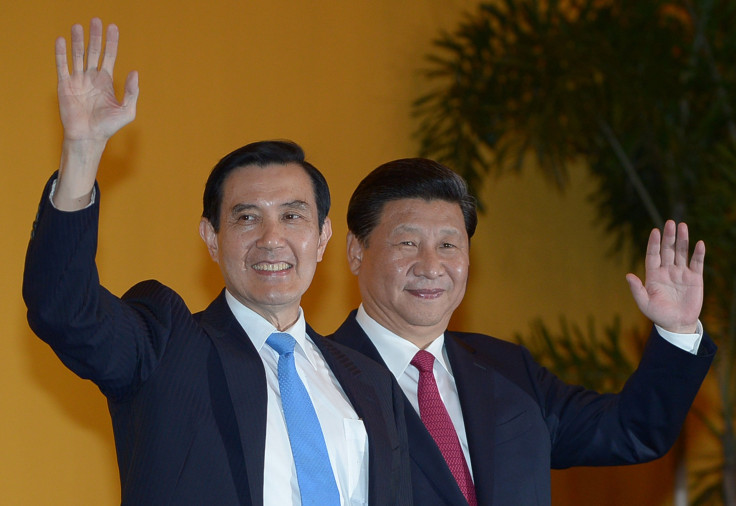Presidents Of China And Taiwan Hold Historic Talks At First Meeting In More Than Six Decades

SHANGHAI -- The leaders of China and Taiwan have begun historic talks in Singapore. It’s the first time the heads of the two sides have met since the Chinese Communist Party defeated Taiwan’s ruling Nationalist Party (the Kuomintang or KMT) in the Chinese civil war in 1949.
After 66 years without top level contact between their states, Chinese President Xi Jinping and Taiwanese President Ma Ying-jeou seemed to find it hard to let go of each other’s hand, as they met for the first time in front of almost a thousand journalists in a Singapore hotel. After a handshake that lasted more than two minutes, a grinning Ma and smiling Xi waved to journalists before walking to a meeting room to begin their formal talks. Later they were due to have dinner together before flying back to their respective capitals.
At the opening of the meeting President Xi said it was a “very special day,” and that the two sides had begun a new chapter in their history. He said they were brothers, and had “the ability and wisdom to resolve our own problems.” Ma said peace was the basis of the two sides' relationship, and the meeting was for the benefit of the next generation.
And there’s no doubt that the meeting is a potentially significant one. Ties between the Chinese Communist Party and Taiwan’s Nationalists have warmed over the past decade -- with trade between the two sides now worth some $200 billion a year, and an estimated one million Taiwanese citizens, mainly business people and industrialists, now working in mainland China.
Yet their political stand-off has never been resolved: China still claims Taiwan as part of its territory, and reserves the right to use force to prevent the island ever declaring formal independence from the mainland. Taiwan, meanwhile, is still officially known as the Republic of China, though in recent decades it has downplayed its previous insistence that it is the rightful government of all of China.
The complexities of the relationship are highlighted by the fact that the two leaders had to agree in advance to address each other as “Mr.” during the meeting, since neither formally recognizes the other’s presidential status. And in its coverage of the meeting, Chinese television did its best to blot out the Taiwanese flag badge that President Ma wore on his lapel, the BBC reported.
The meeting has also been hugely controversial in Taiwan, where supporters of Taiwan declaring independence from China tried to storm the legislature Friday night, in protest at the meeting. Ma’s opponents see the talks as a dangerous compromise with China’s Communist leaders.
Ma, who has sought to improve relations with Beijing since taking office in 2008, by signing a series of economic pacts, has said he will not sign any new accords at his meeting with Xi. And he has pledged to tell the Chinese president that Taiwan wishes to preserve the status quo of its separate identity -- it will not declare independence, he says, but nor will it agree to the formal reunification, which China’s leaders say is their historic goal. Opinion polls in Taiwan routinely show that a majority of citizens are opposed to unification with the mainland under Communist rule.
Ma’s critics have accused him of holding the meeting to secure his own legacy before he steps down in January -- and of seeking to boost the KMT in the January elections to choose his successor. Ma, however, said this week that the meeting could serve as a bridge between the two sides, and establish a precedent for regular meetings between the leaders of the two sides. And a commentary in China’s official Global Times newspaper said the meeting was a “historic breakthrough, creating huge new spaces for the cross-Straits relations.”
Analysts say Beijing may also be hoping that the meeting will help the KMT win more support in the upcoming election, in which the opposition candidate, Tsai Ing-wen, is currently front-runner. Tsai’s Democratic Progressive Party (DPP) is viewed with great suspicion by China due to its traditional links to Taiwan’s independence movement.
However, attempts by China's leaders to influence Taiwan’s elections have not always achieved the desired affect: In 1996, China conducted live-fire missile exercises in the Taiwan Strait, in what was seen as an attempt to warn Taiwanese voters not to re-elect then President Lee Teng-hui, who Beijing mistrusted. Lee was re-elected by a landslide. And in 2000, Chinese leaders warned Taiwan of the risk of electing DPP candidate Chen Shui-bian, who was also promptly elected.
© Copyright IBTimes 2024. All rights reserved.





















